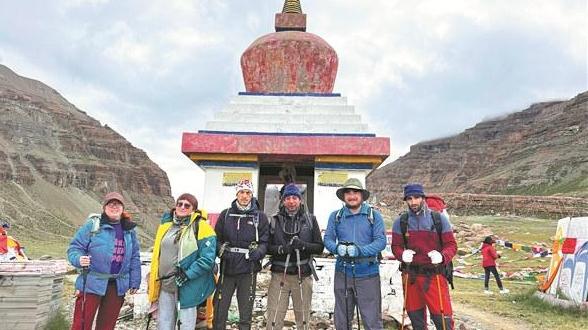Tourists again enjoy Tibet high life
 0 Comment(s)
0 Comment(s) Print
Print E-mail China Daily, October 5, 2023
E-mail China Daily, October 5, 2023
Overseas and domestic tourists enjoy a meal in a Tibetan restaurant in Lhasa in May. [Photo provided to China Daily]
More income for insiders
Jamyang Tsering, a Tibetan tour guide who speaks German and English at the Tibet Vista Tour, says that, with the number of overseas tourists rising this season, his monthly income has doubled.
Before April, he could only earn an average of 6,000 yuan ($827), and his monthly income increased to more than 13,000 yuan thanks to the influx of international travelers.
Jamyang Tsering finds that many overseas tourists feel safe traveling in Tibet, and they also like the food of the region as there are always multiple options available.
"I also find that many overseas tourists are really surprised with the overall developments of the region, and many did not expect that much development before they came," says Jamyang Tsering, adding that most of the Western tourists love to visit Mount Kailash, the Potala Palace, and the ruins of Guge dynasty founded in around AD 912 by Kyide Nyima Gon, the great grandson of the Tubo ruler Langdarma, with its capital in Purang, more than 1,500 kilometers from Lhasa.
"Some guests are more interested about religious cultures of the region, such as the Drigungthil Monastery, and others prefer to go to rural places to see how local people live, dress themselves and practice their religion," he says.
Due to the pandemic, inbound tourism has been suspended for three years, and after reopening services again, many foreign guests are very excited to have the opportunity to visit the region, Jamyang Tsering adds.
Choedhar, a bilingual tour guide in Lhasa, says that, since April, the number of overseas tourists has been increasing, especially the number of the foreigners who work or live in China visiting Tibet.
"For me, I guided many European travelers this year, and I have found that many of them are more interested in the Tibetan traditional culture rather than visiting only for sightseeing," says Choedhar.
"Different sectors of the autonomous region have been making efforts to make it easier for overseas tourists to visit Tibet," Choedhar says, adding that foreign visitors can now find the right tour guides who speak their languages.





